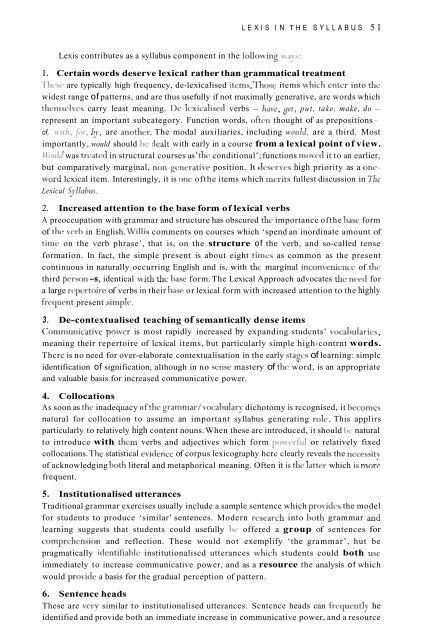Download - Search
Download - Search
Download - Search
Create successful ePaper yourself
Turn your PDF publications into a flip-book with our unique Google optimized e-Paper software.
huve,LEXIS IN THE SYLLABUS 51Lexis contributes as a syllabus component in the folloicing lvays:1. Certain words deserve lexical rather than grammatical treatmentare typically high frequency, de-lexicalised items. Those items \vhich enter into thewidest range of patterns, and are thus usefully if not maximally generative, arc words whichthemselves carry least meaning. De-lcxicalised verbs ~ get, put, take, make, do ~represent an important subcategory. Function words, often thought of as prepositions ~of, with,j;)r, by, are anothcr. The modal auxiliaries, including would, are a third. Mostimportantly, would should be dealt with early in a course from a lexical point of view.I!I/ould was trcatcd in structural courses as ‘the conditional’; functions moved it to an earlier,but comparatively marginal, non-generative position. It dcscrvcs high priority as a onewordlcxical item. Interestingly, it is one ofthe items which mcrits fullest discussion in TheLexical .~llahus.2. Increased attention to the base form of lexical verbsA preoccupation with grammar and structure has obscured the importance ofthe base formof the verb in English. Willis comments on courses which ‘spend an inordinate amount oftimc on the verb phrase’, that is, on the structure of the verb, and so-called tenseformation. In fact, the simple present is about eight times as common as the presentcontinuous in naturally occurring English and is, with thc marginal inconvenicncc of thethird person -s, identical \vith thc base form. The Lexical Approach advocates the nred fora large rcpcrtoire of verbs in their lmsr or lexical form with increased attention to the highlyfrcquent present simplc.3. De-contextualised teaching of semantically dense itemsCommunicative power is most rapidly increased by expanding studcnts’ vocalmlarics,meaning their repertoire of lcxical items, but particularly simple high-contrnt words.Thcrc is no need for over-elaborate contextualisation in the early stagcs of learning: simplcidentification of signification, although in no sense mastery of the word, is an appropriateand valuable basis for increased communicative power.4. CollocationsAs soon as the inadequacy of the grammar/vocabulary dichotomy is rccognised, it heconicsnatural for collocation to assume an important syllabus generating role. This applirsparticularly to relatively high content nouns. When these arc introduced, it should he naturalto introduce with them verbs and adjectives which form pow.l-erfu1 or relatively fixedcollocations. The statistical evidence of corpus lexicography hcrc clearly reveals the nccessityof acknowledging both literal and metaphorical meaning. Often it is the lattr-r which is morefrequent.5. Institutionalised utterancesTraditional grammar exercises usually include a sample sentence which providcs the modelfor students to produce ‘similar’ sentences. Modern research into both grammar andlearning suggests that students could usefully be offered a group of sentences forcomprehension and reflection. These would not exemplify ‘the grammar’, hut bepragmatically identifiablc institutionaliscd utterances which students could both useimmediately to increase communicative power, and as a resource the analysis of whichwould provide a basis for the gradual perception of pattern.6. Sentence headsThese are very similar to institutionalised utterances. Scntcnce heads can frcqucntly heidentified and provide both an immediate increase in communicative power, and a resource


